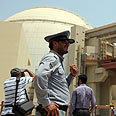
Iran's Bushehr reactor
צילום: AFP
Iran says arrested Stuxnet 'spies'
Intelligence minister says 'nuclear spies' who spread virus aimed at derailing nuclear program arrested
Iran's intelligence minister said on Saturday authorities had arrested several "nuclear spies" who were working to derail Tehran's nuclear program through cyberspace.
Without saying how many people were arrested or when, Heydar Moslehi was quoted on state television's website as saying Iran had "prevented the enemies' destructive activity."
His remarks came against the backdrop of reports that the Stuxnet worm is mutating and wreaking havoc on computerised industrial equipment in Iran and had already infected 30,000 IP addresses.
But Moslehi said intelligence agents had discovered the "destructive activities of the arrogance (Western powers) in cyberspace, and different ways to confront them have been designed and implemented."
"I assure all citizens that the intelligence apparatus currently has complete supervision on cyberspace and will not allow any leak or destruction of our country's nuclear activities."
The website said Moslehi emphasised that his ministry was aware of the different activities of "enemies' spy services."
"We have always faced the destructive action of these (spy) services and a number of nuclear spies have been arrested," he said.
Stuxnet, which was publicly identified in June, is a self-replicating malware found lurking on Siemens systems, mostly in India, Indonesia and Pakistan, but the heaviest infiltration appears to be in Iran, researchers say.
Analysts say Stuxnet may have been designed to target Iran's nuclear facilities, especially the Russian-built first atomic power plant in the southern city of Bushehr.
Officials have denied that Bushehr was among the addresses penetrated by the worm, but acknowledged that some personal computers of the plant's personnel had been infected.
Iran's nuclear ambitions are at the heart of a conflict between Tehran and the West, which suspects the Islamic republic is seeking to develop atomic weapons under the cover of a civilian drive.
Tehran denies the allegation and is pressing on with its uranium enrichment program, the most controversial aspect of its nuclear activities, despite four sets of UN Security Council sanctions.
- Follow Ynetnews on Facebook










